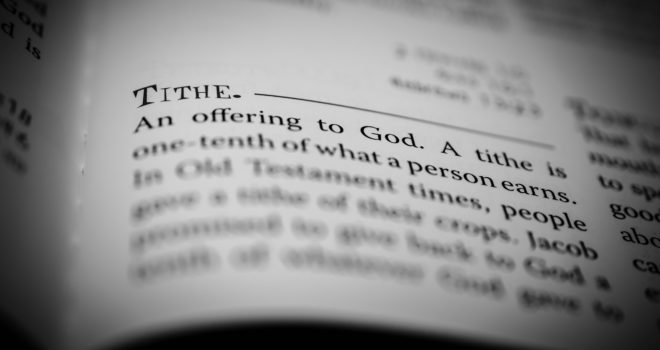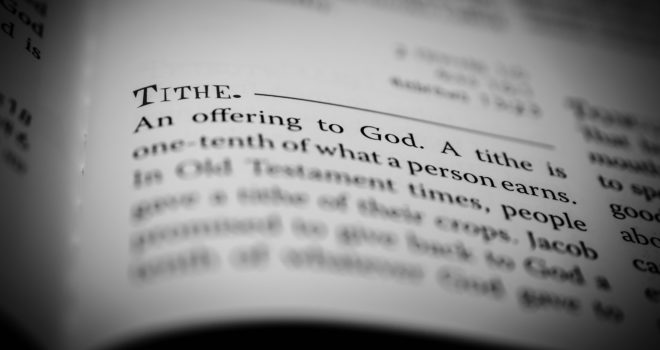You know the impact of 2022’s stock market performance when you look at your retirement plan balances. You feel inflation’s rampant rise first hand when you grocery shop and go out to eat. These realities rightfully cause us to re-think our spending. History shows that many will also ask the question, “To give or not to give?” But, should the results of lower investment balances and the higher cost of hamburgers cause us to cut back our giving?
Unfortunately, there is a direct correlation between giving and stock market performance. But the fact of the matter is that the poor are always with us (Mt.26:11). Should we give or not give to their needs because of the stock market? Should we give or not give to help stock food pantries and soup kitchens, replenish the shelves of the clothing closets, help a single mom with her rent and utilities just because Facebook and Netflix stocks were down over 50%?
How investment markets fare year-to-year is one factor that influences giving. Sadly, there are a few others that may also be used as excuses to reduce giving. The scandal of how the church has responded to abuse is one. Some also cite church ministries engaged in helping immigrants gain legal citizenship as another. But, are these issues worthy determinants of what should drive our giving budgets?
Why do we Give?
What are some of the reasons you give or not? Is it because you like or don’t like the pastor, or like or don’t like the music at church? Is it because you feel obligated and so guilty if you don’t give? Is it because it is an easier way to meet that obligation than volunteering? I hope the answer to all of these is an emphatic “No!”
Even giving to meet a particular need, while helping the church and ministries meet specific needs is important, still, giving to the “need” is not the best reason for giving. The best reason to give is to make an honest response to God for all the blessings He gives to you. Think about the blessings in your life. Even in these crazy times of persistent Covid, international strife, political turmoil, and a probable economic recession on the near horizon, how blessed are you?
Truly, how blessed are we here in America. Even greater than that, how blessed are we as Christians, as children of God? When we embrace the truth of how much God loves us, of His mercy and forgiveness, of His promise of eternal life – WOW! It is overwhelming. It is awe inspiring. It illuminates our need for philanthropy. We know we need to make a return to God for all of His gifts to us. How do we respond to all the blessings and benefits God gives to us? Psalm 116:12 asks, “How can I repay the Lord for all the great good done for me?”
How do you respond to all of God’s blessings? Praise and thanksgiving – yes. Humble gratitude – amen! And by giving back. Giving is the best expression of gratitude you can make to God for all He gives you. Giving money is one of the strongest statements you can make of your faith and trust in God to provide.
As disciples of Jesus Christ we are to put God first in every facet of our life, including first in our financial life. Giving statistics consistently show that our giving as a percent of income suggests our attitude is more of, “Lord, you be first in my life, except the money part. I got that.” But do we? High credit card balances and other financial stresses tell us that most of us don’t.
Giving is important to your overall spiritual well-being. Putting God first in your budget prioritizes spending. It puts more intention and purpose into the practice of your everyday faith. Putting Him first in your financial life draws you closer to Him in your discipleship. Money, then, becomes a tool to help you grow deeper in your relationship with God.
How Much to Give and Where
When you think of your giving budget, how much do you give and where do you give it? As to how much to give, many Old Testament Bible passages support our giving a “tithe” – ten percent. The New Testament takes that even further. I’d be honored to bring my It’s Not Your Money workshop to you to go into all of these. But for brevity, know that the Church teaches that our giving is to be “sacrificial” – just at the edge of what we think we can afford. For some that might be $10 per week. For others it may be tens of thousands. Ask God what the amount is for you that will keep you more fully aware of your dependence on God.
As to where to give, first and foremost, give to your parish. Fully half of your giving budget should go to your parish because that is where you hear the Word of God. That is where you encounter Jesus truly present in the Eucharist. And that is where you develop community with others who are striving to be good disciples just like you are.
Another ten-percent of your giving should go to the Diocesan Appeal. As Catholics, we support the needs of people and the church beyond our parish borders. It’s who we are.
That leaves 40% of your giving budget to allocate. These funds should go to ministries whose missions align with your ideals – what’s important to you. I submit that a goodly portion of these funds should go to ministries that do works of mercy – feeding, clothing, providing shelter, welcoming the stranger, visiting the sick and imprisoned, and helping pregnant women choose life. That is what Jesus tells us in Mt. 25:33-46. He says when we serve the least of our brothers and sisters, we serve Him.
St. Francis said that alms are an inheritance and a justice due the poor which Jesus has levied upon us. Sirach 7:10 instructs us to not neglect giving alms. So give to the needs of the poor and grow closer to Jesus. Give to be a part of something majestic, the grand missions of the Church and Social Service Ministries. Give because it’s not your money.












